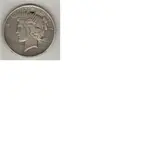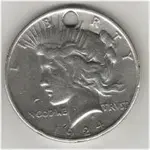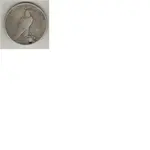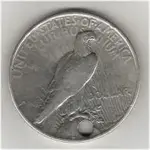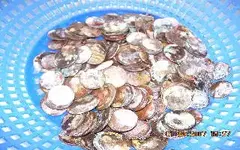Hello, I thought that I would go through what you said and answer.
"Okay, let me first start by saying that I don't want to upset anybody. Maybe I'm being naive or stupid (or both). Regardless I would love to hear some other opinions on this topic because I really just don't get it."
No problem. Like any subject, people have to understand the reason/s why certain 'rules' develop or are put into place or practice. This "rule" to me, is something akin to telling kids not to play with matches. When you are older and more careful, you understand why you don't sit around flicking lit matches around at things. But until you understand why people tell you these things, you don't really understand it.
Most people do not realize how complex coin-collecting can be. One of the reasons is because they do not realize several things about coin-collecting until they have been in the hobby for a few years. There are many aspects to it. If you stop to think of just WHY it is that people collect coins, then the rest of this may begin to make sense.
"I don't understand why cleaning coins is such a bad thing. I know that you can't clean them with sandpaper, that is just common sense. But why not clean them enough to make them look nicer?"
I think that it depends upon a number of factors. One of those might be that it depends upon the coin that you want to clean and/or the way in which you may clean it. But I will tell you this much, the "general rule" that you hear coin-collectors tell those who are just starting off in the hobby about "not cleaning coins" applies to them as NOVICES particularly.
And the reason/s are pretty good ones. Firstly, one should understand that what we are dealing with in coin-collecting are items which were produced in limited quantities and which are for the most part, no longer being made. The concern then, is in terms of the potential for causing damage to what may potentially be a rare commodity. As coin-collectors, we have at one time or another, usually heard of a nice coin or coins which were destroyed or damaged in terms of numismatic value/worth by an amateur who thought that they were doing something either good or harmless to a coin.
One such story that I heard was that of a pair of young men who had some gold coins and who took them to a coin shop to sell them. When they were told by the shop owner that they would have been worth more if they were in better condition, they had the bright idea of taking them home and "shining them up" on a buffing wheel (as if the coin shop owner or anyone else could not have done the very same thing). Well, when they returned to the shop to sell them (hoping to get MORE for the now 'shiny' coins), they were told that they had ruined the numismatic value (collectible value) of the coins and that they were now worth only the metal that they were made of. Does that makes sense to you?
"Who makes up these rules and why do we have to follow them?? (btw - I feel the same way about "manners" - who is the person that decided on what proper etiquette should be. Someone originally made up these so-called rules and the rest of us just follow along - I don't buy into that) Sorry, I went on a little ramble there!!!"
Such "rules" are those which people have learned to share with those who might damage or destroy an otherwise valuable coin, knowing that some coins simply cannot be replaced, and therefore, will no longer be available in the coin market either in the grade that it was once in or as a collectible coin (numismatically speaking). Like the saying, "better safe, than sorry." You learn a LOT of things in coin-collecting through the years of experience that you gain either first-hand or from the mistakes of others.
"Anyway, I got some old coins off of my Grandmother. They were originally my Great Great Uncles and were then left to her when he died. I'm not about to sell them. I am thinking about cleaning them up, putting them in 2X2's and then putting them into a binder. I would like to eventually hand them to my son when he is older."
Secondly, I'd like to say that it depends upon the coin/s. It does no harm to clean a coin which has no numismatic value or rarity to it and which probably will never be collected by anyone. The 'rule' of not cleaning coins is generally given to and by those who collect U.S. coins. If you are collecting ancient coins, that is another story. Many ancient coins require cleaning; but that is also a more specialized field of coin-collecting.
"The point here is that I want to clean them first to make them all nice a shiny!!! I have not cleaned them yet - I wanted to post this first and get everyone's reaction before I do so. But, just to give you an idea, I did clean one of the coins (it has a hole in it anyway - so the value of the coin isn't really in question). But, before I cleaned it, I scanned a picture of it so you all could see the before and after image. I did not change these pictures in any way (besides cropping them down.)"
You have got the right idea in cleaning a coin which has little numismatic value. However, if you plan on leaving coins as a collection which you expect to have any numismatic value for your son, you may want to reconsider 'cleaning' them. That is because cleaning U.S. coins generally reduces their value, sometimes dramatically. Why? Any number of reasons, reasons which I have not seen anyone state to you hear as yet. One of those is the TONE of collectible coins. Toning and color of coins is sometimes one of the ways that people determine the value of a coin numismatically.
Have you ever heard the term, "original mint luster?" Or have you ever heard of "cartwheels" on Morgan silver dollars? Collectors pay more for better examples of collectible coins. The more that they are in their original and/or natural state, the better. Cleaning can do more damage to coins than one may realize at first. Not just in how they may look, but also in how they may hold up condition-wise in the future. Sometimes, chemicals can remain on cleaned coins which will continue to eat away at the metal or the original patina is often lost, and/or innate natural coating/s may be taken off leaving coins to oxidize and corrode. There are many things which can go wrong with coins which have been cleaned. That having been said, I'll go on to another thing which I should mention here as well.
"I personally like the cleaned up coin much better than the coin I had before I cleaned it. What do the rest of you think?? Thanks in advance for any of your thoughts and comments!!!!"
I think that all of us here can relate to how nice and new a cleaned coin may look. But no matter how we may want to think of a cleaned coin as "nice looking," as if it were a new coin; the reality is that a cleaned coin is NOT the same as a new coin. What was the other thing that I wanted to mention here? Though there is a general rule about not cleaning coins, that generally applies to those who are new to coin-collecting and who do not realize the damage that they can do to a collectible coin by doing so. However, that is not to say that no one who is a seasoned coin-collector EVER cleans a coin.
Once people have collected coins for a long time and know what they are doing, they may learn the correct ways to "clean coins" and do so. That is called cleaning coins "professionally." There is a difference between professionals and amateurs. And that, to be truthful with you, is what we are really talking about here. Even people who think that they know how to clean a coin professionally, in reality may not know how or when they might be better off leaving a coin alone. All of this takes time to learn and that comes only with experience.
I hope that my words have helped you to better understand this subject from the point of view of the seasoned coin-collector.
Best wishes,
JDSCOIN



